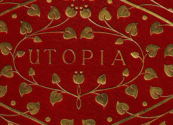Utopian Narration
by Amber Chiac
“There must always be a certain effect of hardness and thinness about Utopian speculation. Their common fault is to be comprehensively jejune. That which is the blood and warmth and reality of life is largely absent; there are no individuals, but only generalized people” (Wells, quoted in Ferns, 9-10).
For my final paper, I am interested in exploring the implications of the seventeenth and eighteenth century utopian narrative paradigm. One similarity among all the utopian narrators we’ve encountered throughout the semester is their lack of psychological complexity. The utopian story is always communicated scientifically or poetically but never with personalization. The narrator functions mainly as a mouthpiece to convey the utopian elements of society from a universal standpoint and the nuances of his/her character are unknown/irrelevant. Some questions are: Why are readers not supposed to psychologize the narrators of these utopian texts? What impact does it have when readers attempt to psychologize them? What are the ideological implications of this narrative mode?
I think there is a connection between the flat one-dimensional narrative style and the theme of nowhereness in utopian texts. I am thinking of Haraway’s argument about objectivity and the “god trick,” which is the “gaze from no where.” The “gaze from nowhere” represents the enlightenment ideal of disembodiment and transcendence, and is particularly masculine. This seems well suited to the utopian narrator who is predominantly male, and to utopia itself, which is imagined as universally desirable. This universalism, or what Wells calls “meta-utopia” opens readers to “multiple and contradictory readings” (Ferns, 9). This keeps texts open and ambiguous and allows authors to mask their intentions. This would have been especially important during the 17th/18th century because of the possibility of political and religious prosecution.
Utopias tend to have a dream-like quality and to be ahistorical (perhaps this has something to do with a utopian dream of immortality?). For example, there is always very scant information conveyed about the formation of utopian islands. This absence may suggest “a reluctance to confront the nature of the relation between the real world and the utopian dream” (Ferns, 27). Ferns argues that a sense of time is lost in utopian narratives because the utopian encounter is always positioned in the past. Since the traveller is always recounting his time in utopia, he is always detached from the experience. Also, because this experience is over, utopia is presented to readers as “whole, static,” and “complete.” Due to this “elimination of time,” there is no sense of “process” (21). In a book called Narrating Utopia, Chris Ferns describes the narrative consequences of this:
In a context where time and historical causation have lost all meaning, the concept of individual character likewise becomes meaningless. Where the birth, life, death of the individual make no difference, individual distinguishing characteristics become insignificant; in narrative terms this tends to result in the replacement of the individual by that more durable construct, the typical citizen (p. 21).
There is a lot of good information in this book but I am struggling to find other sources. Perhaps I could use Bahktin or Foucault to elaborate on these concepts. During my research, I came across Foucault’s work on heterotopias. He uses the mirror as a metaphor for utopia – as a place where one simultaneously exists and does not exist. It is like utopia because what one sees in the mirror does not really exist but it is also heterotopia because it changes the way one relates to his or her image. Looking in the mirror “you find yourself missing in the place that you are.” I think this could be relevant to my project but I need to do more research!
That’s all I have so far. Please let me know if you think there is anything worth pursuing here : )



These questions seem especially urgent:
“Some questions are: Why are readers not supposed to psychologize the narrators of these utopian texts? What impact does it have when readers attempt to psychologize them? What are the ideological implications of this narrative mode?”
The use of Haraway is helpful too!
This seem extremely strong to me and I look forward to seeing it develop. Work to establish a single claim/ argument and follow through from there…
Hey Amber,
I’m pretty much on board with your characterization of the utopian narrators we’ve encountered this semester (at least at the earlier trajectory) — they are de-psychologized, nowhere men (and women) of sorts distancing themselves from place in order to describe, define, and codify ideal conceptions of society.
Furthermore, I like that you complicate this at the end by bringing up Foucault’s notion of heterotopia. I think it would be interesting to look for heterotopic spaces in the early utopias we’ve looked at, seeing as those really do serve to define the genre. One thing that comes to mind (partly because I’m working on it) is the Empress’s relationship with the Duchess in Cavendish. There’s lots of weird stuff about it being an (im)material relationship, and, as we discussed in class, the big thematic there seems to be the possibility of female-female Platonic love.
In my own research, I came across an article on Cavendish and Anzaldua’s “Borderlands” in this book:
http://books.google.com/books?hl=en&lr=&id=77MlivAMvowC&oi=fnd&pg=PA1&dq=carol+thomas+neely+and+heterotopia&ots=UEXLcHL4gR&sig=sJ2kSrCz3WjztYMfzc7yrHw6g4I#v=onepage&q=carol%20thomas%20neely%20and%20heterotopia&f=false
Maybe it could be helpful?
–Stephen